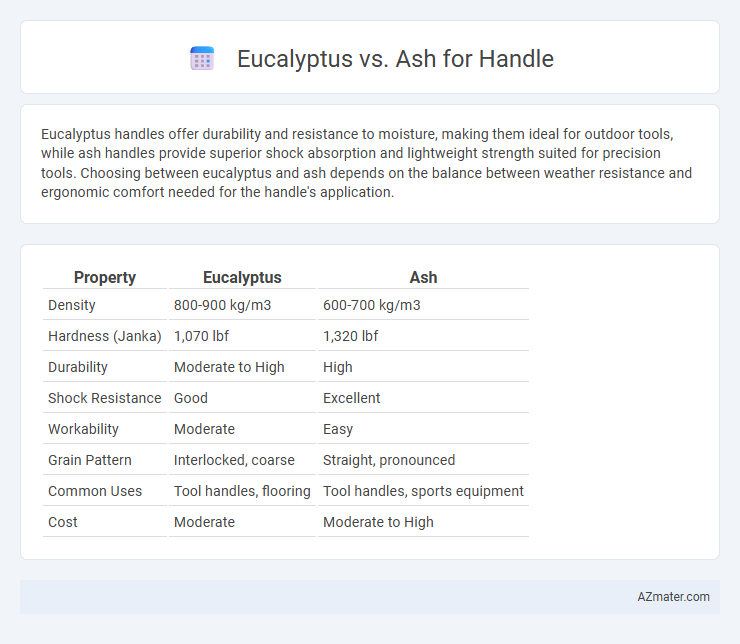Eucalyptus handles offer durability and resistance to moisture, making them ideal for outdoor tools, while ash handles provide superior shock absorption and lightweight strength suited for precision tools. Choosing between eucalyptus and ash depends on the balance between weather resistance and ergonomic comfort needed for the handle's application.
Table of Comparison
| Property | Eucalyptus | Ash |
|---|---|---|
| Density | 800-900 kg/m3 | 600-700 kg/m3 |
| Hardness (Janka) | 1,070 lbf | 1,320 lbf |
| Durability | Moderate to High | High |
| Shock Resistance | Good | Excellent |
| Workability | Moderate | Easy |
| Grain Pattern | Interlocked, coarse | Straight, pronounced |
| Common Uses | Tool handles, flooring | Tool handles, sports equipment |
| Cost | Moderate | Moderate to High |
Introduction: Eucalyptus vs Ash Handle Woods
Eucalyptus handle wood is prized for its durability, natural resistance to moisture, and attractive grain patterns, making it suitable for heavy-duty tools and outdoor applications. Ash handle wood offers excellent shock absorption, lightweight strength, and a smooth finish, favored in traditional tool handles and sporting equipment. Comparing eucalyptus and ash reveals differences in hardness, flexibility, and weather resistance that influence their optimal use in handles.
Botanical Overview: Eucalyptus and Ash
Eucalyptus, belonging to the Myrtaceae family, comprises over 700 species known for their fast growth and dense, hardwood timber ideal for tool handles. Ash, from the genus Fraxinus in the Oleaceae family, features a coarse-grained texture and exceptional strength, commonly used in sports equipment and tool handles. Both woods offer durability and shock resistance, but Eucalyptus tends to provide a heavier, more water-resistant handle compared to Ash's lighter, more flexible qualities.
Physical Properties Comparison
Eucalyptus wood exhibits higher density and hardness, typically ranging from 800 to 1,000 kg/m3, providing superior durability and resistance to wear for tool handles. Ash, with a density around 600 to 700 kg/m3, offers excellent shock absorption and flexibility, making it ideal for handles requiring impact resistance. Eucalyptus's tighter grain structure enhances strength and reduces splintering, whereas ash's open grain allows for better grip and ease of shaping.
Durability and Longevity
Eucalyptus offers notable durability and resistance to moisture and decay, making it suitable for tool handles exposed to outdoor elements. Ash is renowned for its exceptional shock absorption and strength, providing long-lasting performance under heavy use. Both woods deliver solid longevity, but ash typically outperforms eucalyptus in impact resistance and overall lifespan for handles.
Weight and Balance Factors
Eucalyptus handles are typically heavier than ash, providing a dense and sturdy grip preferred for durability and control in heavy-duty tasks. Ash offers a lighter weight with excellent balance, allowing for quicker, more precise tool movements ideal for repetitive or fine work. The balanced wrist positioning of ash handles reduces fatigue, while eucalyptus handles deliver enhanced power transfer in demanding applications.
Shock Absorption and Comfort
Eucalyptus wood offers moderate shock absorption and comfort, making it a durable yet slightly less forgiving choice for handles compared to ash. Ash wood is renowned for its superior shock absorption properties, providing enhanced comfort and reducing user fatigue during extended use. The elasticity and lightweight nature of ash contribute to its preferred status in applications requiring both durability and ergonomic comfort.
Workability and Crafting Ease
Eucalyptus wood offers moderate workability with a coarse texture that may dull tools faster, making it slightly challenging for detailed crafting but durable for handles. Ash is highly favored for handle making due to its excellent workability, straight grain, and shock resistance, allowing smooth shaping and finishing with minimal effort. Both woods provide strength and durability, but Ash generally delivers superior ease in crafting and finishing tasks.
Cost and Availability
Eucalyptus wood handles are generally more affordable due to the tree's rapid growth and widespread availability, making them a cost-effective choice for tool manufacturers. Ash handles tend to be pricier because of their superior shock resistance and durability, as well as the more limited supply in certain regions. Availability of Eucalyptus is higher in Australia and parts of the Americas, while Ash is commonly sourced from North America and Europe, influencing market cost variations.
Environmental Impact and Sustainability
Eucalyptus wood, known for its rapid growth and high carbon sequestration capacity, offers a more sustainable option for handles compared to ash, which grows slower and requires longer harvesting cycles. Eucalyptus plantations promote reforestation and reduce deforestation pressures, while ash forests face increasing threats from pests and diseases, impacting long-term availability. The renewable nature and lower ecological footprint of eucalyptus make it a preferable choice for environmentally conscious handle manufacturing.
Best Applications for Eucalyptus and Ash Handles
Eucalyptus handles excel in applications requiring lightweight and moderate strength, making them ideal for garden tools, cooking utensils, and decorative items due to their smooth finish and durability. Ash handles offer superior shock absorption and high toughness, making them the preferred choice for heavy-duty tools such as axes, hammers, and sporting equipment like baseball bats. The dense grain structure of ash provides excellent resistance to splitting, while eucalyptus's sustainability and resistance to moisture extend the lifespan of handles used in damp environments.

Infographic: Eucalyptus vs Ash for Handle
 azmater.com
azmater.com